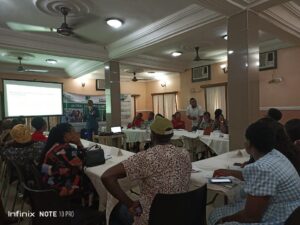“A staff member’s computer was hacked, ruining the work we were doing then. Based on what we have learned today, I can assure you that that kind of situation will never repeat itself.” These were the words of a participant at the Digital Security Clinic (DSC) held in Umuahia, Abia State, on November 16-17, 2023. The Clinic organized by Spaces for Change in partnership with SeidiHub under the Ford Foundation-supported Civic Space Resource Hub for West Africa project (CSR-Hub project) primarily targeted activists and civil society organizations (CSOs) in Abia State experiencing high incidents of hacking and digital threats.
The two-day Clinic featured highly-interactive and practical sessions covering topical digital rights issues and trends such as regulations, national security, whistleblowing, data protection, investigative journalism, protection mechanisms, encryption, and online safety practices. To begin with, participants learned about the fundamental freedoms underpinning digital rights, the nature and scope of digital rights violations, and the legal instruments that afford protections against online harms. The introductory sessions set the tone for understanding why digital safety is paramount for activists and civil society organizations.
Technology has refined how activists, campaigners, and CSOs carry out their activities around research, advocacy, investigative journalism, whistleblowing, and campaigns to hold governments and corporations accountable and challenge injustices. Undertaking these activities exposes civic actors to high risks of physical harm and targeted attacks both online and offline. Against this backdrop, the Clinic aims to equip civic actors with the skills and resources for maintaining online safety while navigating dangerous advocacy tasks and responsibilities.
Although male and female civic actors are exposed to these threats, data from the Closing Spaces Database indicates that the odds are significantly higher for women. One of the expert facilitators took a deep dive into online safety for women. The facilitators carefully explored, along with participants, the kinds of risks women are exposed to online and how to navigate them. The female participants shared experiences of varying sorts of cyberbullying, stalking, and shaming, which resulted in self-censorship and dampened their morale. Through shared experiences, case studies, and practical exercises, participants learned about privacy setting techniques, encryption tools, and digital hygiene practices that enhance protection against different types of online threats.
Very importantly, one of the sessions exposed participants to the social and rapid response mechanisms that are available to them should their activism put them or their families in harm’s way. This session explored local and international mechanisms, government- and nonprofit-led mechanisms that have been put in place to support activists in times of need. The training also shared other insightful sessions around storytelling in the digital age, showcasing the myriad ways participants can leverage the internet to tell impactful stories, whether oral, visual, or otherwise.
Elated participants couldn’t hide their excitement at the end of the power-packed clinic. As one of them put it, ‘This is the best training I have ever attended in my life’. The Digital Safety Clinic, supported by the Ford Foundation, aims to strengthen the institutional resilience of CSOs in West Africa as they engage in advocacy on digital spaces.




